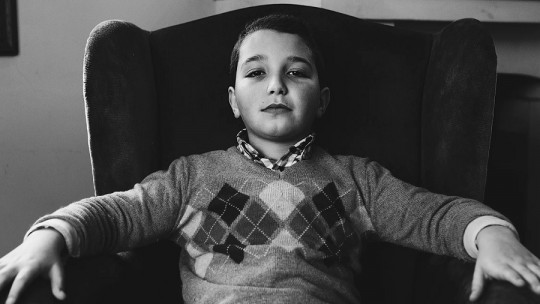Each one of us is different from the others. We have different lives and stories, which make us see reality in a unique and unrepeatable way. However, there are common patterns of behavior and ways of perceiving the world. Although we do not technically form our personality until we have passed through adolescence and acquired our identity, some of our personality traits will be visible from childhood.
An example of this is the existence or not of shyness. Although it is a trait that is not (contrary to what many seem to think) harmful in itself, the truth is that it can make it difficult to express your feelings and thoughts and reduce the possibility of establishing emotional ties with your peers or to reduce the quality of theseHow to help shy children in your day to day life? In this article we offer a series of proposals that can help overcome this shyness.
What do we consider shyness?
Shyness is considered a temperamental trait consisting of the tendency to withdraw, not to express emotions and thoughts easily and to attract as little attention as possible. We are faced with a trait linked especially to the level of self-esteem and security, correlating negatively with both and especially with the latter.
Shy children will tend not to express themselves in the presence of strangers or people they do not trust, look for safer environments and avoid exposure or attracting attention in large crowds. In other words, the shy child has a reserved behavior and is usually more contemplative, although deep down she may want to actively participate in what is happening.
It is important Do not confuse shyness with introversion: The introverted person needs lower levels of external activation than an extravert, needing less social contact. It’s not that he’s asocial or doesn’t have friends, he just needs less contact. However, a shy child may have an extroverted nature and not express it due to fear or insecurity.
As we have mentioned, this trait is not necessarily negative. And on the one hand, it makes it easier for the subject in question to evaluate the situations and act after analyzing and checking the functioning of the situations. On the other hand, if it is very pronounced it can limit the interaction of the person who has it with the environment and make social relationships difficult It is in this last situation, when the shy child begins to have problems derived from said trait, that we ask ourselves what we can do to help him overcome his shyness.
Tips to help shy children
When trying to help a child overcome their shyness, we must keep in mind that a large part of their situation stems from a lack of confidence and security. We must also keep in mind that, even if the intentions are good, some of the classic ways that many use to help their children overcome their shyness can actually further decrease their self-confidence and self-esteem. That is why some ways to help shy children that may be useful are discussed below.
1. Encourage their achievements
It is important for a child, especially if he is shy and insecure, to see how his approaches to acting are encouraged and experienced as something positive by their parents or teachers Praising and congratulating her performance will make the child feel more confident and facilitate and reinforce his future behavior and expression. Of course, the congratulations must be sincere.
2. Teach him to relativize and positively value his mistakes
Making mistakes is not bad, but it gives us an opportunity to learn. Shy people usually have a certain fear of doing things wrong and being judged for it. Teach him that that is not so. It’s not about pretending to do everything well, but about make him see that making mistakes is positive since in the long run it allows him to improve his performance and that does not mean that he will be poorly considered.
3. Don’t point it out or criticize it
Closely linked to the previous one. A child who feels insecure is not going to feel better because we tell him that he is shy or criticize his lack of performance. It is a mistake that, although it may seem surprising, many people make in their attempt to encourage their little ones, as an outburst of misdirected anger or even without realizing it.
4. Increase positive self-instructions and self-reinforcement
Shy people tend to undervalue their achievements and maximize their mistakes, as well as not sufficiently self-reinforcing the former. It is also common for self-instructions to be given with negative or doubtful overtones, such as the typical “I can’t…” or “I don’t know…”. We must ensure that these ways of self-direction are changed, as well as that he congratulates himself when he does things well.
5. Generate socialization opportunities
A good way to try to help shy children overcome their shyness is to facilitate the existence of situations in which they can test and face their insecurities and meet people. For example, going to the park with him allows you not only to share time together but also to come into contact with your peers It is important that at least initially the parent or a trusted figure is present or nearby, so that the child can seek support and feel safer.
6. Don’t force it!
Although it may seem contradictory to the previous point, it is not. It is one thing to facilitate the child’s ability to have social contact, but quite another to force him to do so when he does not want to or to force him to play with or get close to children that he does not know or want to know. This will be seen as an imposition and as something aversive, resistance appears and makes it difficult to really overcome shyness. It is about the child flowing naturally, not how or when we want him to do it.
7. Overprotection doesn’t help
It is logical that we want our children, students or children in general to be safe and happy at all times. And as we have said, criticism, signaling and experiencing social action as an obligation do not help but harm the possibility of increasing their self-confidence. But putting them in a bubble where they do everything well, everything is done for them and where nothing bad ever happens can also lead to the same thing: the child may feel unable to cope with real life not knowing how to react to environmental and social demands or to possible aversive elements.
8. Set an example
Little ones imitate what they see at home since childhood. One way to help them overcome shyness is to model how they interact with others. If they conceive that proactivity and socialization are normal, they will learn ways to make them observe and it will be easier for them to act in the same way.
9. Promotes your decision-making and responsibility
One way to help the child feel more confident in himself is to involve him in decision-making. Propose that he decide things, no matter how minor they may be (for example, where they want to go or what they want you to play), and making them effective allows them to see that their opinions are taken into account and that they have an effect on reality.
10. Hobbies
Another aspect that can help shy children so that their character does not interfere or even for this trait to decrease is carrying out activities of interest to them. Writing, board games, sports, painting, music, dance or cooking are some examples of activities that they may enjoy, and whose mastery can increase their self-confidence. Of course, again we remember that the child has to like it and not be an element of pressure.
11. Theater or role plays
Although in reality it could be included in the previous section, this element has been separated because in it the child must take the role of another person or being, representing a series of characteristics and ways of doing things that do not have to be their own.. The child can learn and observe other ways of acting. Interpretation also tends to favor the emergence of improvisation and having a fast pace that, although demanding, does not usually leave much time to assess whether things are being done well or badly.
12. It encourages expression
It is important to keep in mind that shy children tend to keep things to themselves. Therefore, the use of techniques and activities that allow their expressiveness is useful. Drawing, symbolic play or creating stories with him are good ways to do it.









